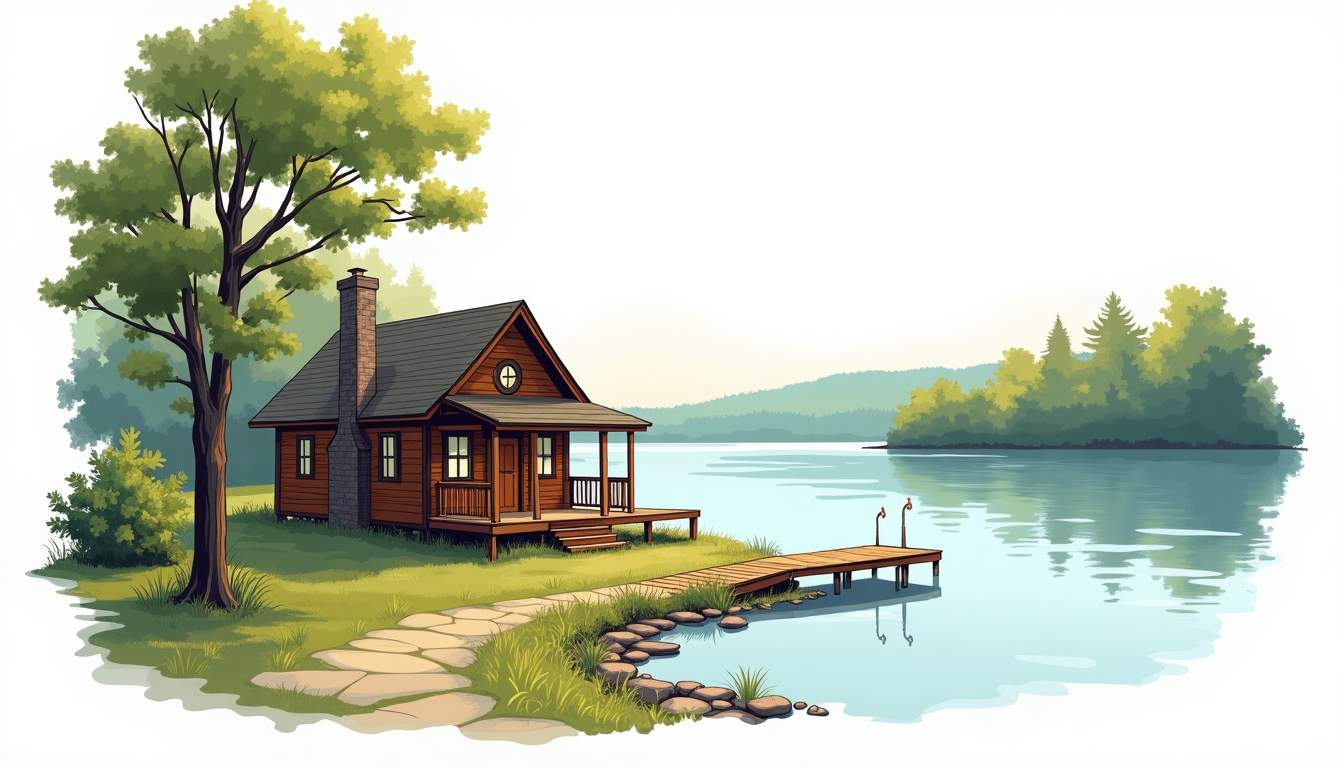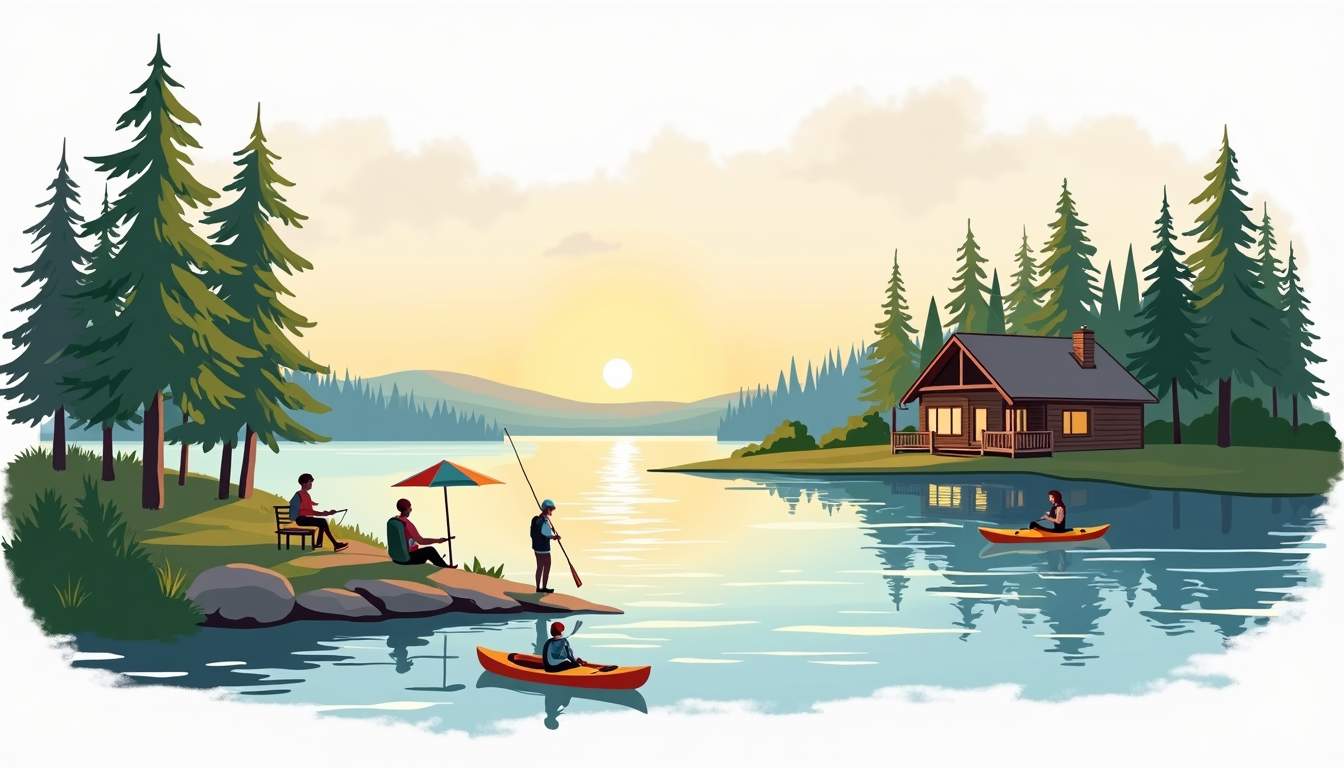
Watts Bar Lake, straddling the Tennessee River system, is a place where quiet coves, forested shorelines, and wide-open water offer a retreat from urban pace. Finding a home here means balancing lifestyle priorities—privacy, access to water, neighborhood character, and resale potential. This guide outlines practical steps, neighborhood profiles, and decision-making tips to help find a peaceful lakeside home that suits long-term comfort, weekend escapes, or retirement plans.
Peaceful can mean different things: solitude on a secluded cove, community camaraderie in a small lake subdivision, or a quiet rural property with expansive views. Before house hunting, list the features that create tranquility for daily life. Consider noise sources (boat traffic, neighbors, nearby highways), natural elements (trees, birdsong, breezes), and social rhythms (seasonal visitors, weekend crowds).
Prioritizing specific attributes narrows the search and prevents compromises that could undermine satisfaction. For example, if stargazing and nocturnal quiet matter most, properties near marinas or busy public boat ramps might be poor matches even if they have prime water frontage. Conversely, someone seeking occasional social activity may prefer a subdivision with a community dock, where light conversation and shared events are common without being intrusive.
How close to the water must the property be? Is private dock access essential? How much upkeep is acceptable for shoreline maintenance and landscaping? What kind of view—wide-open lake, wooded shoreline, or a private cove—creates peace? Use answers to these questions to eliminate large numbers of listings quickly and to communicate clearly with agents or sellers.
Watts Bar Lake stretches across multiple counties and includes varied shoreline character: rocky bluffs, gently sloped banks, and heavily forested coves. Different stretches of shoreline attract different types of residents—weekenders, anglers, retirees, and full-time families. Learning the lay of the land helps match homes to desired lifestyles.
Smaller communities dotting the lake each have their own feel. Some neighborhoods have homeowners associations and shared docks, fostering neighborly routines and maintenance standards. Others are more rural, with larger parcels, little oversight, and greater privacy but potentially higher maintenance responsibility. Proximity to nearby towns affects access to groceries, healthcare, and cultural amenities, which is important for full-time residents or retirees.
Focus on areas known for quieter living—coves and inlets away from main channels typically experience less boat traffic. Northern stretches of the lake and some of the deeper finger coves near marinas provide sheltered waters and tree-lined serenity. Areas closer to industrial or commercial zones, or to major bridge crossings, tend to be noisier. Look at maps and satellite imagery to identify the balance between open water and protected shoreline.
Local real estate agents who specialize in lake properties bring valuable insights: seasonal patterns of boat traffic, shoreline erosion tendencies, and community culture. Seek agents with specific experience on Watts Bar Lake rather than a generalist who covers rural properties broadly. They can show comparable sales, suggest off-market opportunities, and point out neighborhood quirks that aren’t obvious online.
Talking to neighbors and local contractors yields practical knowledge. Neighbors can share first-hand experience with water levels, noise and boating habits, and wildlife abundance. Contractors reveal the realities of dock maintenance, septic systems, and foundation work in lakefront conditions. This grassroots intelligence complements formal inspections and helps anticipate long-term upkeep.
Inquire about seasonal patterns: which weekends get crowded, wind directions that affect waves, and common boat speeds in the area. Ask about flood history and shoreline maintenance practices. For neighbors, questions about wildlife, HOA rules (if applicable), and any recurring nuisances provide a realistic sense of daily life beyond photos and listings.
Peaceful living often depends on reliable infrastructure—safe roads, power stability, and cell/internet service. Rural lakeshore properties can have limited broadband options or may rely on private wells and septic systems. Confirm utility arrangements before committing: on-site inspections and conversations with utility providers help avoid surprises like poor cell coverage or expensive well drilling.
Road quality is another essential factor. Gravel or narrow roads can be scenic but may become difficult in bad weather or pose challenges for frequent visitors. Consider how emergency services would reach the property and the practicalities of daily errands. A tranquil setting loses its appeal if basic access becomes a burden.
Whether a private dock is included or local regulations allow construction, understand the permitting process and cost. Some areas require permits for fixed docks versus floating docks, and local water management authorities may have rules regarding shoreline stabilization. If dock access is shared, verify maintenance responsibilities and usage terms to avoid future conflicts.
Standard home inspections are essential, but lakeside living introduces specific concerns. Look for signs of shoreline erosion, foundation settling, and water intrusion. Check the condition of retaining walls, riprap, and any boat structures. Ask inspectors to evaluate the septic system, well water quality, and roof integrity given humid, lakeside conditions.

Vegetation matters too. Trees protect the shoreline and provide privacy but may also drop limbs that damage roofs or docks. Map out which trees could be hazards in storms and factor potential removal or maintenance costs into the decision. Also, consider the native plant and animal species—some properties offer more privacy and shade because of mature trees and undergrowth.
Visit the property at different times—early morning, midday, and evening—and on both weekdays and weekends. Boat traffic, noise, and neighborhood activity can vary dramatically. Seasonal visits reveal how waterfront conditions change with water levels or seasonal foliage. A home that feels peaceful in winter might be lively in the summer, which could influence whether it suits full-time residency or a quiet getaway.
True isolation can be restorative, but consider the trade-offs. Remote parcels may have longer emergency response times, limited social contact, and greater demands for self-sufficiency. For many, a middle ground—secluded yard and forest buffer yet reasonable proximity to town—strikes the right balance.
Assess the nearby community fabric: are neighbors friendly and respectful of quiet hours? Does the neighborhood have informal routines like community cleanups or quiet boating hours that contribute to tranquility? A collaborative community can reinforce a peaceful atmosphere without formal rules.
Landscaping and outdoor layout can extend privacy and tranquility. Native plantings stabilize shoreline soil, attract beneficial wildlife, and create visual buffers. Sound barriers—berms and dense shrubbery—dampen distant traffic noise. Position living spaces and decks to face quiet coves rather than the main channel to enjoy calm water views and reduced activity visibility.
Watts Bar Lake properties may come with specific legal considerations: easements for utilities, floodplain regulations, and property line ambiguities along the water. Hire a local real estate attorney or title company to review plats and deed restrictions. Confirm whether any shorelines are subject to public access rights or conservation overlays that could affect privacy or development plans.

Insurance for waterfront homes can be costlier and may require specialized coverage for flood or wind damage. Obtain insurance quotes early to understand long-term affordability. Factor in ongoing dock maintenance, shoreline stabilization, and potential HOA fees when calculating total ownership costs.
Even if the intention is to stay long-term, resale considerations remain prudent. Properties with private, well-maintained shoreline and easy access to town amenities tend to retain value. Conversely, parcels subject to frequent flooding or with restrictive access roads can be harder to sell. Consider features that broaden appeal—functional dock, flexible living spaces, and low-maintenance landscaping—without sacrificing the peaceful qualities that attracted interest in the first place.
Finding and living in a peaceful home on Watts Bar Lake also means embracing stewardship. Respect for neighbors, mindful boating, and thoughtful shoreline management preserve tranquility for everyone. Practices like using native plants, minimizing bright nighttime lighting, and following quiet hours on the water help maintain a serene environment.

Engaging with local community groups and lake associations gives access to collective resources, from shoreline erosion workshops to volunteer cleanup days. Such involvement not only protects the natural setting but also builds connections with neighbors who share a commitment to keeping the lake peaceful.
Before making an offer, run through a practical checklist: Clarify definitions of peaceful for the household; verify utility reliability and internet options; inspect shoreline and septic/well systems; visit at different times and seasons; confirm dock and permitting rules; review legal documents and insurance needs; and consult local professionals. These steps ensure the home delivers the calm lifestyle envisioned without unexpected burdens.
Watts Bar Lake offers a rare combination of natural beauty and varied neighborhoods. The most peaceful homes are those that align clear lifestyle priorities with practical realities—access, maintenance, community dynamics, and long-term costs. With careful planning, local insight, and thoughtful property selection, a lakeside home can be a lasting haven of quiet and natural rhythm.
Patience in the search yields better outcomes: viewing thoughtfully, asking the right questions, and leaning on local expertise increases the chance of finding a property that feels like a true lakeside retreat for years to come.
Ready to find a tranquil lakeside home that combines natural beauty with luxury living? Tennessee National offers a premier gated community nestled in Tennessee’s scenic landscapes, featuring a Greg Norman Signature Golf Course, private marina, waterfront dining, and over 20 exclusive amenities. Whether you envision a move-in ready residence or a custom build, our resort-style lifestyle is designed to suit your desires for privacy, comfort, and community. Schedule a private tour today and take the first step toward making Tennessee National your peaceful lakeside haven.